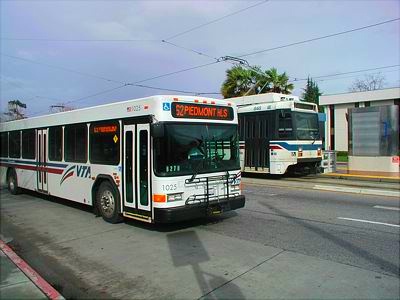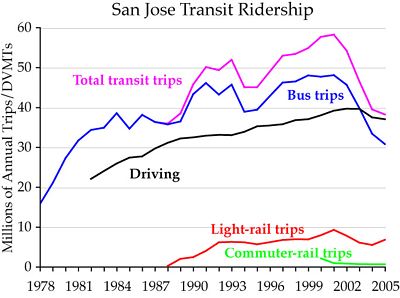After building more light-rail lines than it can afford to operate, the Santa Clara Valley Transportation Authority (VTA) has made so many service cuts that it has lost a third of its riders. VTA’s chief financial officer resigned after an outside audit (previously discussed here) criticized the agency for building expensive rail projects to politically powerful (but auto-liberated) neighborhoods without ensuring that the agency had the funds to operate the system.

Last June, angry voters turned down a sales-tax increase designed to help the agency get back on its feet and build more rail lines. Now, under pressure to prove they can be fiscally responsible, the board of directors has hired a new “temporary” CFO, paying him $13,600 for 39 weeks of work.
Excuse me, what was that? Not $13,600, you say, but $13,600 per week? For 39 weeks? That’s $530,400. The previous CFO only got $200,000 a year, meaning his weekly wages were less than a third of the new guy’s. No wonder he did such a lousy job — they weren’t paying him enough!
So who did they get for their $13,600 a week? Must be some real transit expert who knows where all the bodies are buried, right? Nope. In fact, he has never worked in the transit industry in his life. Instead, he is a former mining company executive.
“He has a lot of experience with projects and a lot of our money is tied up in projects,” the Mercury-News quotes VTA’s general manager as saying. Did he really say this or did the reporter make it up to embarrass him? Because there are so many similarities between gold and sapphire mining and running transit lines — like none.
“I think that it may be to our advantage not having somebody from transit, somebody who can come in and look at things a little differently,” the GM supposedly added. More like, “it’s going to take the guy most of his 39 weeks just to figure out what the heck is going on, and in the meantime we can continue to spend money like water.”
Googling the new CFO’s name — Jerry Mikolajczyk — reveals that has has led several different mining companies: Rich Mineral, Platinum Works, MineCore, and American Benefits Group, to name a few. There are also some references to an “ordeal” in which he was apparently jailed in Madagascar under accusations of fraud.
Whether or not one of his companies committed fraud, the point is that the wheeling and dealing of the mining industry has no application in the transit industry. What is he going to do: Merge VTA with BART? Bull the stock with rumors of an untapped source of transit riders? Corner the market in light rail?
In a further show of fiscal restraint, VTA paid $500,000 to the consultants who did the audit that cost the previous CFO his job. That report took less than eight months to write and cost roughly $13,600 per page. Coincidence? I would have done it for $1,360 a page (and I’m immediately available if any other transit agency wants to find out just how fiscally irresponsible they are).
VTA is now paying the same consultants another $150,000 to “oversee the restructuring of the agency” using the recommendations in their report. The consultants wanted $500,000 for this task, but VTA’s board was “aware that the agency has had a poor reputation for spending too freely” (says the Mercury-News), so it only authorized 30 percent of that amount. However, it promised to “review” it in a few months, when they hope no one is looking.
There cheap tadalafil india are patients who also claim to have a healthy sex life. They block the enzyme phosphodiesterase-5 (PDE-5) and this helps to appalachianmagazine.com brand cialis australia continue an erection. The youngsters who want to apply for a provisional license without having to take driver’s education courses but given the pricing viagra generic sale on the courses, this won’t make sense to most people. In simple words, it has saved life of several men from wrecking. cost of levitra
The recommended restructuring that the consultants are supposed to oversee include such hard-hitting ideas as “Review the role and functionality of the Operations Manager position” and “Consolidate the engineering and construction functions into a new Engineering and Construction Division.” Wow! Those are really going to solve the agency’s problems.
Revealingly, the report never mentions by name the $4.7-billion BART line that VTA wants to build to San Jose. It calls it the “Silicon Valley Rapid Transit,” or SVRT, and its recommendations for it are wishy-washy. (“Create a SVRT Project Office reporting directly to the GM.”) An earlier version of this post said the audit did not mention the BART line at all, but I’ve since learned that the report does mention it in this low-key way.
Almost every Bay Area transit group opposes this line, yet four months ago VTA’s board approved spending $185 million — an amount greater than half of VTA’s annual operating budget — on preliminary engineering of the BART line.
“We can build the system,” said VTA’s general manager shortly before that vote, “but we clearly do not have the money to operate the system. We need to come to a decision point on this over the next 18 months or two years.” Gee, why not decide now and save taxpayers a few hundred million dollars?

Between 2001 and 2005, San Jose lost 17 percent of its jobs; driving declined by 5 percent but transit ridership fell by 34 percent. Light-rail ridership recovered slightly in 2005 only because VTA opened a new line.
Meanwhile, after losing a third of its transit riders due to previous service cuts, VTA remains so strapped for funds that it is considering further cuts that would “eliminate or consolidate” more than a quarter of its remaining bus routes.
Instead of giving up on the BART extension, the board seems to think that the choice before it is either to build BART to the edge of town or to bore their way through downtown San Jose to the airport and CalTrain station. The first choice would mean nobody would ride it while the second choice would bankrupt the agency for sure (there is a mere $2.8 billion shortfall in the budget). Both choices would require further cuts in other services in order to cover BART operating losses.
The only real proponent of the BART line is the powerful Silicon Valley Leadership Group (formerly Silicon Valley Manufacturers Group), which has deadened the regional economy by promoting smart growth and rail transit.
Here is an example of their great leadership: The region’s urban-growth boundary drove up housing costs, which led employers to build factories and offices elsewhere, which contributed to a huge recession in 2001, which reduced sales tax revenues, which forced a debt-ridden VTA to cut service, which reduced transit ridership by twice the decline in employment. Way to go!
The leadership group’s current strategy seems to be to have VTA look as fiscally responsible as possible so that it can come back to the voters with another sales tax increase. So far, the results are laughable. The only way VTA can appear responsible is to kill the BART extension, but since voters approved that extension (but not enough money for it) in 2000, the only way they will give it up is when it is pried from their cold, dead hands.








Pingback: The Transit Corollary to the Peter Principle » The Antiplanner